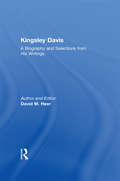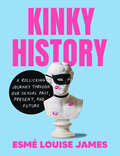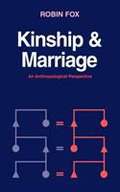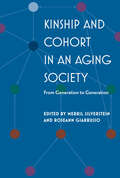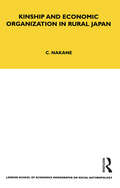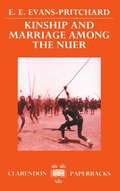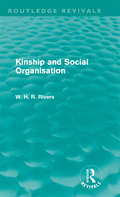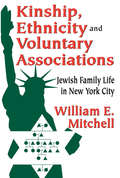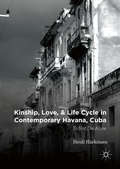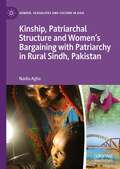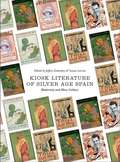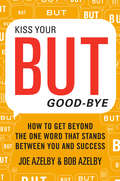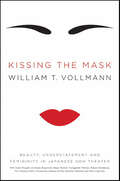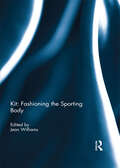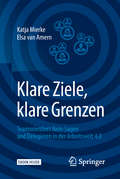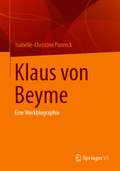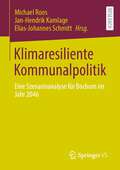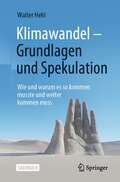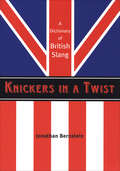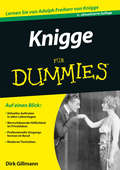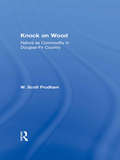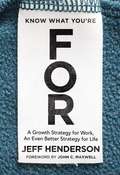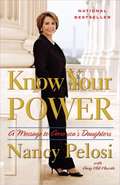- Table View
- List View
Kingsley Davis: A Biography and Selections from His Writings
by David M. Heer"Kingsley Davis (1908-1997) was one of the pioneers in social demography, and was particularly identified with the theory of the demographic transition. This holds that the process of industrialization first causes mortality to decline, leading to a substantial rate of population growth and only later causes fertility to fall, leading eventually to the cessation of population growth. Kingsley Davis is especially remembered for his arresting and forceful critique of family-planning programs intended to achieve zero population growth.Before he devoted his major attention to social demography, Davis had distinguished himself through influential articles on the structure of family and kinship, including the topics of jealousy and sexual property, the sociology of prostitution, and illegitimacy. He had an early interest in structural-functional analysis, which resulted in his famous and controversial article on stratification, co-authored with Wilbert Moore, and his equally famous presidential address to the American Sociological Association in 1959.David Heer's biography of Kingsley Davis is based on material contained in the Kingsley Davis Archive at the Hoover Institution Library at Stanford University, the Kingsley Davis graduate file at Harvard University, the interview of Kingsley Davis by Jean van der Tak in Demographic Destinies (1990), and David Heer's personal relationship with Kingsley Davis. The book also contains thirty of the most important writings by Kingsley Davis. These were chosen, in part, for the number of citations received in the Cumulative Social Science Citation Index, and in part to ensure that readers would be able to assess the continuity of Kingsley Davis's ideas at all stages of his career."
Kinky History: A Rollicking Journey through Our Sexual Past, Present, and Future
by Esmé Louise JamesA provocative journey through human sexual history, packed with fun factoids and forgotten stories, from the historian and storyteller behind Kinky History, @esme.louisee on TikTokContrary to popular belief, our predecessors had all sorts of obscene hobbies long before Christian Grey hit the scene. In this enlightening romp, learn about the first instances of homosexuality on record from the ancient world and the diverse history of nonbinary gender; encounter a thousand years&’ worth of hilarious and horrifying contraceptive methods; consider the positive and negative effects of the widespread availability of pornography in the digital age—and how our relationship to it changed during the pandemic; take a sneaky riffle through centuries of bedside drawers; and discover the dirty little secrets of luminaries such as Julius Caesar, James Joyce, Albert Einstein, and Virginia Woolf. Esmé Louise James also identifies the key tipping points that directly inform current beliefs around sex to place the past in conversation with the present. By educating ourselves about the weird, wonderful, and varied spectrum of human sexuality and experience, we can normalize and destigmatize sex, write people of marginalized sexual identities back into the pages of history, and build toward a more liberated future.
Kinship And Marriage: An Anthropological Perspective (Cambridge Studies In Social And Cultural Anthropology #50)
by Robin FoxRobin Fox's study of systems of kinship and alliance has become an established classic of the social science literature. It has been praised above all for its liveliness of style and clarity of exposition in an area that students and general readers have found difficult to master. It was the first attempt to produce an overview of this central subject and has maintained its unique position over the years. Fox's reconciliation of 'descent' and 'alliance' theories, and his 'deductive' approach to the logic of kinship systems based on four universal premises, give the book its distinctive flavour and make it not only the best available introductory text but a contribution to theory in its own right. It has been used throughout the world as an introduction for both academic and lay readers and has been translated into numerous languages.
Kinship and Cohort in an Aging Society: From Generation to Generation
by Merril Silverstein Roseann GiarrussoAccording to family sociologist Vern Bengtson, generations within families are important sources of influence, change, and development.Kinship and Cohort in an Aging Society brings together scholars whose common link is their intellectual intersection with the work of Vern Bengtson, an esteemed family sociologist whose accomplishments include foundational theoretical contributions to the study of families and intergenerational relations as well as the development of the widely used Longitudinal Study of Generations data set. The study began in 1971 and is the basis for Bengtson’s highly influential concept and measurement model, the intergenerational solidarity-conflict paradigm. This book serves as an excellent compendium of original research that examines how Bengtson’s solidarity model, a theory that informs nearly all intergenerational and gerontology sociology work performed today, continues to be relevant to scholars and practitioners.Written by internationally recognized scholars, the book’s fifteen chapters are mapped to five major thematic areas to which Bengtson’s research contributed: family connections; grandparents in a changing demographic landscape; generations and cohorts (micro-macro dialectics); religion and families in the context of continuity, change, and conflict; and global cross-national and cross-ethnic concerns. Key strengths of the book include the diversity of foci and data sources and the strong attention given to global and international issues.Kinship and Cohort in an Aging Society will appeal to scholars working in sociology, psychology, gerontology, family studies, and social work.
Kinship and Economic Organisation in Rural Japan (LSE Monographs on Social Anthropology #Vol. 32)
by Chie NakaneIn this essay the author presents the principles of one important sector of social organization in Japan, and establish its framework. Japanese kinship structure, with its multiple historical and local factors, and unlike that of the Chinese or of the Hindus, does not belong to the category of unilineal systems, nor to any kind of descent pattern found in the published literature of social anthropology. Social anthropology, developed by micro-synchronic studies of simpler societies, and with its major analysis devoted to descent systems, has to face in Japan a critical methodological test. In this essay, the author, as a social anthropologist, want to overcome these drawbacks of anthropological method, and to demonstrate one of the new approaches by which an anthropologist can cope with the data from a sophisticated society
Kinship and Marriage Among the Nuer
by E. E. Evans-PritchardSir Edward Evans-Pritchard's classic writings on the Nuer of southern Sudan have made them one of the most famous peoples in ethnographic literature. When the writings were first published half a century ago, they created a new agenda for social anthropology. Kinship and Marriage among the Nuer is the second of his trilogy on the society and culture of this pastoral people. It vividly portrays the experience of growing up in a Nuer community, describing daily life, marriage, sex, death, and birth. It also makes clear the essential difference between the discourse of political association and that of kinship, and shows the part played by the kinship system in Nuer society as a whole. Now published for the first time in paperback, this edition has a substantial introduction by Wendy James in which she assesses the importance of Evans-Pritchard's work and places it in the context of recent developments in social anthropology.
Kinship and Social Organisation (Routledge Revivals #Vol. 34)
by W. H. RiversFirst published in 1914, W. H. R. Rivers' hugely influential study was the first to effectively demonstrate the close connection between methods of denoting relationship or kinship and forms of social organisation, including those based on different forms of the institution of marriage. He also shows that the terminology of relationship has been rigorously determined by social conditions and that, therefore, systems of relationship furnish us with a most valuable instrument in studying the history of social institutions. This series of lectures was originally delivered by the author in May 1914, at the London School of Economics. They are based on the experiences of the Percy Sladen Trust Expedition to Melanesia in 1908.
Kinship, Ethnicity and Voluntary Associations: Jewish Family Life in New York City
by William E. MitchellHow can Jewish relatives who range in residence and occupation from a Scarsdale doctor to a Brooklyn butcher, and who diverge in religiosity from an Orthodox cantor to a ham-eating atheist, maintain close family ties? It is a social truism that families with conflicting life styles scattered over a sprawling urban area fall apart. Even those families with a strong sense of duty to stay together begin to lose their cohesiveness as members' contacts become increasingly erratic and highly preferential. In "Kinship, Ethnicity and Voluntary Associations", William E. Mitchell describes how these intimate, spirited, and often contentious family clubs are organized and how they function.This project delves into family circles and clubs, two remarkable social innovations by New York City Jews of Eastern European background, that attempt to keep relatives together even as the indomitable forces of urbanization and industrialization continue to split them apart. The family circle first appeared on the New York City Jewish scene in the early 1900s as an adaptive response to preserve, both in principle and action, the social integrity of the immigrant Jewish family. It consisted of a group of relatives with common ancestors organized like a lodge or club with elected officers, dues, regular meetings, and committees.Family circles and cousins' clubs continued to exist as important variant types of family structure in New York Jewish communities for many years. Mitchell, in this work, deals with the challenging problems of how Jewish family clubs happened to emerge in American society and their theoretical implications for contemporary kinship studies. The research methods used in the study include a combination of intensive informant interviews, participant observation, and respondent questionnaires. This is an unusual, innovative contribution to cultural anthropology.
Kinship, Love, and Life Cycle in Contemporary Havana, Cuba
by Heidi HärkönenThis book is an ethnographic analysis of gender, kinship, and love in contemporary Cuba. The focus is on the lives of low-income Havana residents over the life cycle from birth to death. The book documents how kinship and love relations are created, reproduced, and negotiated at different life stages through gendered dialectics of care, important to both individuals' relationships and state politics. In the process, through a variety of practices and meanings, ranging from rituals to understandings of sexual desire, gender becomes affirmed as the central social difference characterizing Cuban society. The book argues that Cubans live their lives embedded in social networks of care that are both emotionally and pragmatically central to individual existence. At the same time, the island's contemporary political and economic changes carry gendered consequences to everyday relationships, with the potential to introduce unexpected changes to the life cycle. iv>
Kinship, Patriarchal Structure and Women’s Bargaining with Patriarchy in Rural Sindh, Pakistan (Gender, Sexualities and Culture in Asia)
by Nadia AghaThe book provides insights into the prevailing patriarchal system in rural Pakistan. It elaborates on the kinship system in rural Sindh and explores how young married women strategize and negotiate with patriarchy. Drawing on qualitative methodologies, the book reveals the strong relationship between poverty and the perpetuation of patriarchy. Women’s strategies help elevate their position in their families, such as attention to household tasks, producing children, and doing handicraft work for their well-being. These conditions are usually seen as evidence of women’s subordination, but these are also strategies for survival where accommodation to patriarchy wins them approval. The book concludes that women’s life-long struggle is, in fact, a technique of negotiating with patriarchy. In so doing, they internalize the culture that rests on their subordination and reproduce it in older age in exercising power by oppressing other junior women.
Kiosk Literature of Silver Age Spain: Modernity And Mass Culture
by Susan Larson Jeffrey ZamostnyThe so-called “Silver Age” of Spain ran from 1898 to the rise of Franco in 1939 and was characterized by intense urbanization, widespread class struggle and mobility, and a boom in mass culture. This book offers a close look at one manifestation of that mass culture: weekly collections of short, often pocket-sized books sold in urban kiosks at low prices. These series published a wide range of literature in a variety of genres and formats, but their role as disseminators of erotic and anarchist fiction led them to be censored by the Franco dictatorship. This book offers the most detailed scholarly analysis of kiosk literature to date, examining the kiosk phenomenon through the lens of contemporary interdisciplinary theories of urban space, visuality, celebrity, gender and sexuality, and the digital humanities.
Kiss Your BUT Good-Bye: How to Get Beyond the One Word That Stands Between You and Success
by Joseph Azelby Robert AzelbyA simple, engaging, and eminently practical guide to overcoming your weaknesses—your "Buts"—to achieve the career and personal relationships you want Imagine a workplace where all the employees are aware of the things they do—or fail to do—that prevent them from being more productive and valuable. Imagine a company where everyone speaks openly and honestly about his or her weaknesses and is committed to strengthening and overcoming them. Imagine an environment where colleagues help one another become more efficient and less disruptive by speaking the truth about what detracts from the team's efforts and objectives. Imagine a place where the firm's most talented employees know exactly what they need to do to attain a leadership position. This is no fantasy workplace: it can be your business if you listen to Joe Azelby and Bob Azelby, brothers and successful executives in their own right.Kiss Your BUT Good-Bye will help all professionals find their individual BUT—whether it's a lack of skills, a distracting behavior, or a personality quirk that interferes with achieving success. Using road-tested techniques, Kiss Your BUT Good-Bye helps you examine your BUT, understand it, manage it, cover it, and most important, shrink it. It also enables managers to help their employees discover personal weaknesses and to learn how to deliver the direct, honest feedback every worker needs and deserves.Finding your BUT can be tough medicine, but the Azelbys deliver it with a tasty spoonful of sugar. Get ready for success . . . get ready to Kiss Your BUT Good-Bye.
Kiss of a Dolphin
by Tom TuohyThis quote by John Kemp is taken from the first page of Kiss of a Dolphin and sums up the essence of the book: ... "Tom Tuohy's book does what I have been working to accomplish my entire life. Not only is it a pleasure to read, but reminds us all that kids can face so many disabling conditions on their way to growing up -- that poverty is no less immobilizing than conditions brought about by illness or accident. In a single work, it embodies so many of the ideals that the civil rights and advocacy movements of all types have been striving for throughout the past fifty years. It is a story about courage and fear. Many people fear those with disabilities: perhaps it is self-consciousness and a desire to not say or do the wrong thing. Not only do the people at Dreams for Kids appear to have no worries about doing the wrong thing, they seem to have adopted the "can do" attitude so necessary to positive change. And, they give everyone a place to start: the book encourages readers to look at the person in the wheelchair or with a cane, to get past any fear or self-consciousness, and start by saying "Hi." I love this book. I love it because Tom and his friends understand, at the deepest possible level, that everyone is disabled, at some time, in some way. It is clear the barriers Dreams for Kids remove have less to do with adaptive equipment than with the opportunity they give people to see themselves in a different way. And, it is equally clear that these opportunities are at least as valuable for the volunteers, as they are for the recipients."
Kissing the Mask: Beauty, Understatement and Femininity in Japanese Noh Theater
by William T. Vollmann“Intrepid journalist and novelist William T. Vollman’s colossal body of work stands unsurpassed for its range, moral imperative, and artistry.”—BooklistWilliam T. Vollmann, the National Book Award–winning author of Europe Central, offers a charming, evocative, and piercing examination of the ancient Japanese tradition of Noh theatre and the keys it holds to our modern understanding of beauty. Kissing the Mask is the first major book on Nohby an American writer since the 1916 publication the classic study Pisan Cantos and the Noh by Ezra Pound. But Kissing the Mask is pure Vollman—illustrated with photos by the author with provocative related side-discussions on femininity, transgender, kabuki, pornography, geishas, and more.
Kit: Fashioning the Sporting Body
by Jean WilliamsThis is the first edited collection of its kind to analyse the distinct but overlapping topics of dress, costume, sport and leisure history. For researchers of bodily adornment and movement, sport and costume history are both primarily concerned with industrial practice and embodied experience. The ways in which bodies are adorned, embellished and clothed (or revealed) highlights the hybrid nature of dress history, encompassing as it does the everyday clothing solutions of the mass of people and the unusual or more ceremonial aspects of costume, as well as elite high fashion. Although this is as yet an under-researched area, there are an increasing number of fashion and clothing undergraduate and postgraduate courses that specialise in sport and leisurewear. This publication is intended to give an introductory overview of the historical and contemporary issues as it does for the growing number of sport marketing and sports studies courses concerned with dress, costume history and branding.This book was published as a special issue of Sport in History.
Klare Ziele, klare Grenzen: Teamorientiert Nein-Sagen und Delegieren in der Arbeitswelt 4.0
by Katja Mierke Elsa Van AmernDieses Sachbuch zeigt, wie Stress im Job auf persönlicher Ebene, im Dialog, und im System entsteht und wie er wirksam reduziert werden kann. Wissenschaftlich fundiert mit praktischen Tipps zur Optimierung greifen die Autorinnen kritische Situationen der digitalen Arbeitswelt auf. Erfahren Sie, wie Sie durch klare Entscheidungen und eindeutige Kommunikation die persönliche Resilienz stärken und den gemeinsamen Erfolg im Unternehmen sicherstellen.Im Zentrum des Buches stehtWie Stress entsteht und welche Rolle Erfahrungen, Erwartungen und andere Kognitionsmuster dabei spielenWie Sie sich in komplexen Situationen gezielt strukturieren und trotz Mehrdeutigkeit einen klaren Standpunkt entwickelnWie Sie Ihren Standpunkt nach außen gut vertreten, ohne in typische Kommunikationsfallen zu tappenWelche weit reichenden Vorteile klare Ziele und klare Grenzen systemisch für das gesamte Team bringenDas Werk wendet sich an alle, die sich den Anforderungen des permanenten Wandels in der VUKA-Welt gegenübersehen. Hier den Überblick zu wahren, Entscheidungen unter Unsicherheit zu fällen und klare Absprachen zu treffen ist eine Herausforderung für Führungskräfte, Mitarbeiter und Selbstständige ebenso wie für Ehrenamtliche. Im Mittelpunkt steht dabei, wie jeder für sich im konkreten Kontext ein klares Ja ebenso wie ein klares Nein ermöglichen kann und damit dauerhaft für alle Beteiligten gesunde Leistungsfähigkeit fördert.
Klaus von Beyme: Eine Werkbiographie
by Isabelle-Christine PanreckKlaus von Beyme forschte und lehrte im Zeitalter der Konfrontationen und Umbrüche: Der Kalte Krieg, die Studentenrevolte 1968/69, die Spaltung des politikwissenschaftlichen Fachverbandes 1983 und der Systemwechsel 1989/90 hinterließen ihre Spuren in den Schriften des international bekannten Heidelbergers. Die Werkbiographie durchdringt das umfangreiche Werk von Beymes, offenbart ideengeschichtliche, zeithistorische und biographische Wurzeln, zeitgenössischen Widerhall in politischen und fachlichen Kontroversen sowie langfristige Prägungen der deutschen Politikwissenschaft.
Kleine Forscherinnen und Forscher in Bewegung: Rekonstruktion von Erkundungsaktivitäten bei ein- bis dreijährigen Kindern in der Bewegungsbaustelle (Bildung und Sport #33)
by Björn BrandesErkundende und spielerische Aktivitäten sind für die frühkindliche Entwicklung von zentraler Bedeutung. Dies wird sowohl in entwicklungspsychologischen als auch in bewegungspädagogischen Überlegungen immer wieder herausgestellt. Im Bereich der elementaren Bewegungsfertigkeiten bieten insbesondere offene Bewegungsangebote, wie die Bewegungsbaustelle, besondere Potenziale für solche Aktivitäten. Gerade im Kleinkindbereich wurde bisher allerdings nicht empirisch und gegenstandsspezifisch untersucht, welche Formen von Bewegungsaktivitäten Kinder in der Bewegungsbaustelle vollziehen, wie die damit verbundenen Erkundungs- und Spielprozesse verlaufen und wie diese von pädagogischen Fachkräften angestoßen und begleitet werden können. In diesem Buch werden die Erkundungsaktivitäten von ein- bis dreijährigen Krippenkindern in der Bewegungsbaustelle in den Blick genommen und im Rahmen einer qualitativen Untersuchung einer empirisch-rekonstruktiven Analyse unterzogen. In einem Untersuchungszeitraum von drei Monaten wurden dazu 23 Stunden Videomaterial in einer Hamburger Krippe erhoben und anschließend mit den Verfahren der Grounded Theory Methode ausgewertet. An neuere sozial-konstruktivistische Konzepte in der Frühpädagogik anschließend werden in einem Ausblick erste Ansätze herausgearbeitet, wie Fachkräfte offene Bewegungssituationen im Kontext der rekonstruierten Erkundungsaktivitäten entwicklungsförderlich betreuen und begleiten können.
Klimaresiliente Kommunalpolitik: Eine Szenarioanalyse für Bochum im Jahr 2046
by Michael Roos Jan-Hendrik Kamlage Elias-Johannes SchmittDie konkreten gesellschaftlichen Folgen des Klimawandels sind sehr unsicher und nicht vorhersagbar. Die Szenarioanalyse erlaubt es, Vorstellungen möglicher Zukünfte zu entwickeln. Das Buch stellt vier kohärente Zukunftszenarien für die Stadt Bochum im Jahr 2046 vor und zeigt, wie daraus konkrete Maßnahmen für politische Entscheidungsträger*innen hergeleitet werden können. Die Leser*innen dringen in utopische und dystopische Erzählungen ein, die die wissenschaftlich fundierte Entwicklung der Szenarien anschaulich werden lassen. Darüber hinaus bietet das Buch eine Einführung in die Methode der Szenarioanalyse, die für den Aufbau von Aktivitäten der städtischen Vorausschau (Urban Foresight) auch in anderen Kommunen hochgradig relevant ist.
Klimawandel – Grundlagen und Spekulation: Wie und warum es so kommen musste und weiter kommen muss
by Walter HehlKlimawandel ist in aller Munde, aber die Zusammenhänge aus den Bereichen Physik, Chemie und Systemtheorie zu verstehen ist schwer. Wolken können Sonnenstrahlung abweisen (kühlen) oder helfen, Wärmestrahlung zu speichern (zu wärmen). Es ist naturgemäß viel schwieriger, das Zusammenwirken solcher gegenläufiger Trends zu verstehen als eindeutige Abläufe. In diesem Buch sind die Zusammenhänge auf das zum Verständnis Notwendige reduziert und in einen historischen Zusammenhang gestellt, so dass sich ein schlüssiges Bild ergibt – ohne spezielles Fachwissen. Woher kam die Unentschlossenheit vergangener Jahrzehnte, ob wir einer Erwärmung oder einer neuen Kaltzeit entgegensteuern? Wie ist dies wissenschaftlich zu bewerten? Welche Rolle spielen Entwicklungen von Technologien und wie beeinflussen sie Politik und Philosophie? Welche Phasen der Erkenntnis wurden durchlebt und wie wichtig sind sie für wissenschaftliche und gesellschaftliche Akzeptanz? Gegen welche Rückkopplungen im Klimasystem müssen wir ankämpfen? Ein Anliegen des Buches ist es, nicht naiv zu sein, sondern auf der Basis sicherer Informationen die ganze Realität zu erfassen.
Knickers in a Twist: A Dictionary of British Slang
by Jonathan BernsteinDon&’t play the silly bugger in front of your mates! Take a deep dive into British language and culture with this &“hilarious and entertaining&” reference (Chicago Tribune). Brits and Americans dress the same, eat at the same chain restaurants, and pass music back and forth across the Atlantic, and our national leaders are practically conjoined twins. But the second the Brits open their mouths, all bets are off. So don&’t dream of visiting the United Kingdom, dating a Brit, or truly understanding what Jude Law is saying without this handy, hilarious, and informative guide to Britspeak. With the cheekiness of Austin Powers and the tidbit quotient of Schott&’s Miscellany, screenwriter Jonathan Bernstein&’s collection of Cockney rhyming slang, insults culled from British television shows of yore, and regional and &“high British&” favorites provides hours of educational, enlightening, even life-saving hilarity. And if it doesn&’t accomplish that, at least you&’ll be aware that when a British citizen describes you as a &“wally,&” a &“herbert,&” a &“spanner,&” or a &“bampot,&” he&’s not showering you with compliments. Knickers in a Twist is as indispensable as a London city guide, as spot-on funny as an episode of The Office, and as edifying as Born to Kvetch and Eats, Shoots and Leaves. &“Indispensable.&” —Vanity Fair &“Will probably do more for revolutionizing the way you and your nearest and dearest address one another than any other book out this year . . . Often bring[s] an overt chuckle.&” —Edge New York
Knigge für Dummies (Für Dummies)
by Dirk GillmannSie haben eine gute Kinderstube genossen und empfinden dennoch in der ein oder anderen Situation Unsicherheit darüber, wie Sie sich korrekt verhalten sollen? "Knigge für Dummies" gibt eine Übersicht über die Welt der Höflichkeit und des guten Benehmens. Angefangen von den ursprünglichen Gedanken des Freiherrn von Knigge bis zu zeitgemäßen Umgangsformen bei Tisch liefert das Buch Bestätigungen und Ergänzungen Ihres Wissens.
Knock on Wood: Nature as Commodity in Douglas-Fir Country
by W. Scott PrudhamScott Prudham investigates a region that has in recent years seen more environmental conflict than perhaps anywhere else in the country--the old-growth forests of the Pacific Northwest. Prudham employs a political economic approach to explain the social and economic conflicts arising from the timber industry's presence in the region. As well, he provides a thorough accounting of the timber industry itself, tracing its motivations, practices, and labor relations.
Know What You're FOR: A Growth Strategy for Work, An Even Better Strategy for Life
by Jeff HendersonYour organization - business, church, or nonprofit - will experience unprecedented growth when you close the gap between these two game-changing questions: What are we known for? What do we want to be known for?In Know What You're FOR, entrepreneur and thought leader Jeff Henderson makes it clear that if we want to change the world with our products or our mission, then we must shift the focus of our messaging and marketing. Rather than self-promoting, we must transform our organizations to be people-centric. This sounds like a no-brainer, but looking closer shows just how little this is true and how impactful the change would be if it were. Whether you're a business leader, a change advocate, or a movement maker, Know What You're FOR will help you - and your organization - thrive. It's what happens when you create an organization focused on who it is FOR. This is the future. Thriving organizations will be more concerned with becoming raving fans of their customers than they are trying to convince customers to become raving fans of the organization. This isn't theory. Jeff Henderson has experienced it. Working with companies like Chick-fil-A and the Atlanta Braves, then serving as a pastor for 15 years at one of the country's largest and most influential churches, North Point, Jeff knows what success looks like for healthy organizations and healthy lives. With fascinating stories from a host of entrepreneurs and Jeff's remarkable career, Know What You're FOR equips you with a simple strategy and the tools for extraordinary growth. You'll discover how to:Work FOR your current and future customers with a new, effective methodBe FOR your team and help your people reach full potentialCreate a ripple impact by being FOR your communityLive and work your best by caring FOR yourselfIn a hypercritical, cynical world, one that is often known for what it's against, let's be a group of people known for who and what we're FOR. It's a powerful strategy for business. But more importantly, it is a revolutionary way to live.
Know Your Power: A Message to America's Daughters
by Nancy Pelosi Amy Hill HearthWhen Nancy Pelosi became the first woman Speaker of the House, she made history. She gavelled the House to order that day on behalf of all of America's children and said, "We have made history, now let us make progress." Now she continues to inspire women everywhere in this thought-provoking collection of wise words--her own and those of the important people who played pivotal roles in her journey. In these pages, she encourages mothers and grandmothers, daughters and granddaughters to never lose faith, to speak out and make their voices heard, to focus on what matters most and follow their dreams wherever they may lead. Perhaps the Speaker says it best herself in the Preface: "I find it humbling and deeply moving when women and girls approach me, looking for insight and advice. If women can learn from me, in the same way I learned from the women who came before me, it will make the honor of being Speaker of the House even more meaningful." This is a truly special book to share with all the women you know. It is a keepsake to turn to again and again, whenever you need to be reminded that anything is possible when you know your power.
